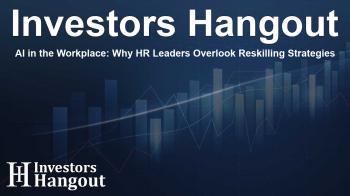AI in the Workplace: Why HR Leaders Overlook Reskilling Strategies

Understanding the Current Landscape of AI and Workforce Management
As artificial intelligence (AI) continues to shape the future of work, it raises important questions about how companies prepare their employees for the changes ahead. A recent survey conducted by a reputable organization has unveiled a crucial gap: despite recognizing AI's growing impact, many HR leaders are not focusing on reskilling their workforce.
The Alarmingly Low Priority of Reskilling
According to the survey, only a mere 7% of Chief Human Resources Officers (CHROs) are actively implementing reskilling strategies for roles most likely to be affected by AI. This statistic is concerning, as it implies that a vast majority are not taking the necessary steps to prepare employees for impending changes in job roles.
Experiments Over Strategies
So, what are HR executives focusing on instead? They appear to be concentrating on experimentation with AI through pilot programs and use cases tailored for human capital management processes. While testing new technologies is vital, it is equally important to ensure that the workforce is equipped with the knowledge and skills to adapt to these changes.
The Risks of Neglecting Reskilling
Diana Scott, a leader at the research organization, noted the perils of neglecting upskilling and reskilling. Organizations that fail to address these needs risk falling behind. The competitive advantage offered by a well-prepared workforce cannot be underestimated.
Stability Amid Uncertainty
Despite these alarming trends, the overall outlook among CHROs regarding workforce conditions remains stable. The organization's CHRO Confidence Index saw a slight dip, from 55 to 54, indicating a cautious yet somewhat optimistic view moving into the next year. Engagement expectations, in particular, are showing signs of improvement.
Key Findings from the Survey
The survey leads us to several key findings that highlight the priorities of HR leaders. While only a small percentage are prioritizing reskilling, a staggering 62% are focused on using AI in pilot programs. This marks a significant shift in the way HR functions are being approached.
Addressing Concerns Surrounding AI
Moreover, 36% of HR leaders are advocating for governance strategies to manage the risks associated with AI, such as job displacement. Furthermore, a notable 21% are developing AI literacy programs for employees to enhance understanding and implementation of these technologies.
Hiring, Retention, and Engagement Trends
The survey delved deeper into hiring, retention, and engagement metrics. The CHRO Confidence Index for hiring has decreased to 54 in the last quarter. Worryingly, 19% of leaders expect their hiring to decrease over the next six months, a leap from 11% just six months prior.
Mixed Feelings About Retention
Retention rates also present a mixed bag. The index for retention slightly dipped to 53, yet the long-term trend shows improvement from last year's low. While 21% foresee a deterioration in retention, 34% optimistically predict enhancements in this area.
A Bright Spot: Employee Engagement
On a positive note, engagement levels are experiencing a resurgence, with the CHRO Confidence Index reflecting improved expectations for employee engagement into the new year. This should inspire HR leaders to consider engagement strategies and how they align with overall workforce development.
Final Thoughts
In an era where AI technology is becoming increasingly prevalent, it is crucial for HR leaders to rethink their priorities. While the focus on creative AI applications is essential, so is ensuring that employees have the skills they need to thrive in a rapidly changing environment.
Frequently Asked Questions
1. What percentage of CHROs prioritize reskilling their workforce?
Only 7% of CHROs report that they are implementing reskilling strategies for roles affected by AI.
2. What is the primary focus of HR leaders regarding AI?
HR leaders are primarily focusing on AI experimentation through pilot programs rather than employee reskilling.
3. How has the CHRO Confidence Index changed recently?
The CHRO Confidence Index decreased slightly from 55 to 54 in the last quarter.
4. Are retention expectations improving among CHROs?
Retention expectations are showing mixed signals, with some leaders predicting an improvement.
5. What are the reported engagement expectations for the future?
Engagement expectations are optimistic, with many CHROs anticipating an increase in employee engagement levels.
About Investors Hangout
Investors Hangout is a leading online stock forum for financial discussion and learning, offering a wide range of free tools and resources. It draws in traders of all levels, who exchange market knowledge, investigate trading tactics, and keep an eye on industry developments in real time. Featuring financial articles, stock message boards, quotes, charts, company profiles, and live news updates. Through cooperative learning and a wealth of informational resources, it helps users from novices creating their first portfolios to experts honing their techniques. Join Investors Hangout today: https://investorshangout.com/
Disclaimer: The content of this article is solely for general informational purposes only; it does not represent legal, financial, or investment advice. Investors Hangout does not offer financial advice; the author is not a licensed financial advisor. Consult a qualified advisor before making any financial or investment decisions based on this article. The author's interpretation of publicly available data shapes the opinions presented here; as a result, they should not be taken as advice to purchase, sell, or hold any securities mentioned or any other investments. The author does not guarantee the accuracy, completeness, or timeliness of any material, providing it "as is." Information and market conditions may change; past performance is not indicative of future outcomes. If any of the material offered here is inaccurate, please contact us for corrections.
